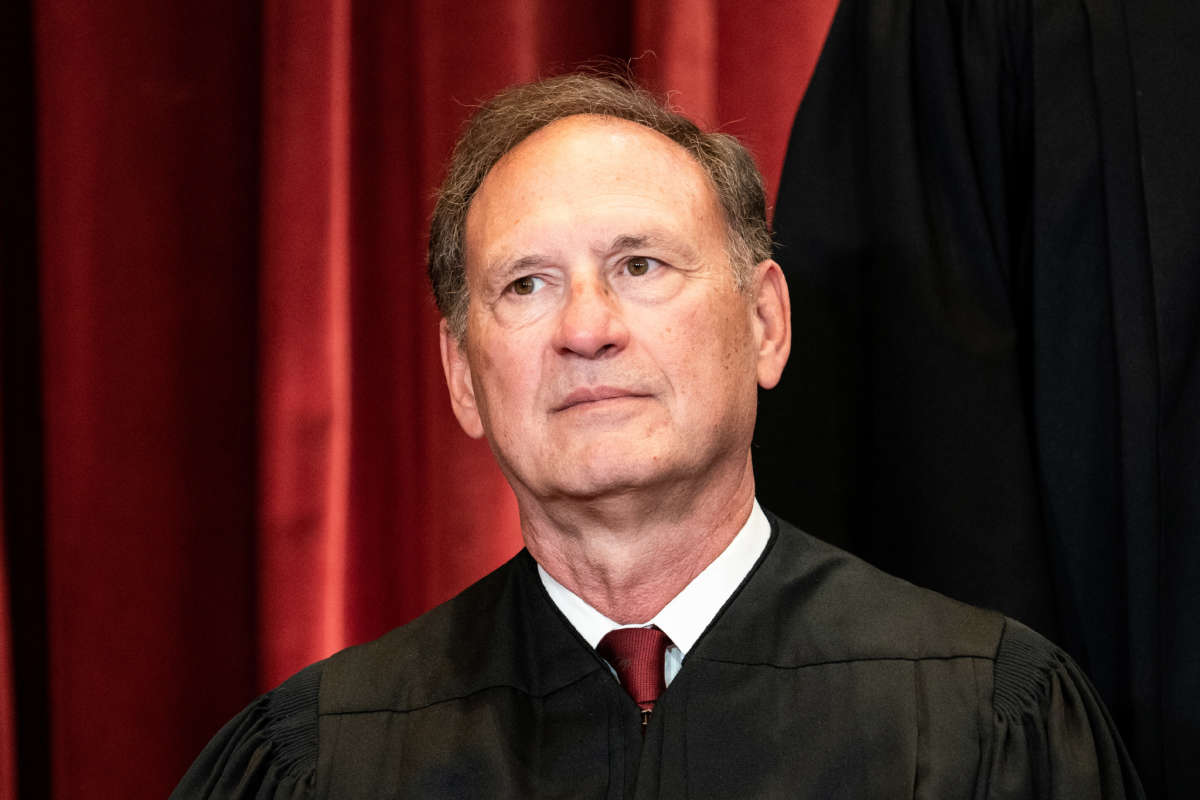Supreme Court Justice Samuel Alito mocked world leaders who criticized his anti-abortion ruling last month and decried what he called a “hostility to religion” in his first public comments since the decision.
Alito, who authored the court’s majority opinion in the Dobbs case that overturned Roe v. Wade, bragged during a surprise appearance at a religious conference hosted by the Notre Dame Law School’s Religious Liberty Initiative in Rome last week that he wrote the opinion in what he described as the case “whose name may not be spoken.”
“I had the honor this term of writing I think the only Supreme Court decision in the history of that institution that has been lambasted by a whole string of foreign leaders who felt perfectly fine commenting on American law,” he said.
“One of these was former [British] Prime Minister Boris Johnson. But he paid the price,” Alito said, referring to Johnson’s unrelated decision to resign, drawing laughs and cheers from the crowd.
“Others are still in office,” he added, calling out French President Emmanuel Macron and Canadian Prime Minister Justin Trudeau for their remarks before lobbing an attack on Prince Harry.
“But what really wounded me was when the Duke of Sussex addressed the United Nations and seemed to compare the decision whose name may not be spoken with the Russian attack on Ukraine,” he quipped.
Prince Harry during a speech at the U.N. said that the court’s decision, along with the invasion of Ukraine, are both evidence that “we are witnessing a global assault on democracy and freedom.”
“Despite this temptation, I’m not going to talk about cases from other countries,” Alito continued. “All I’m going to say is that, ultimately, if we are going to win the battle to protect religious freedom in an increasingly secular society, we will need more than positive law.”
In his Rome speech on religious liberty, Justice Alito mocked “foreign leaders” who condemned his opinion overturning Roe v. Wade, including Boris Johnson, Macron, Trudeau, and … Prince Harry.
Of Boris, Alito quipped: “He paid the price.” https://t.co/NPqalw0KA6 pic.twitter.com/xC0qguZ31n
— Mark Joseph Stern (@mjs_DC) July 28, 2022
Alito during his remarks alleged that “religious liberty is under attack” even though the impenetrable conservative majority on the Supreme Court gave religious rights groups their biggest wins in generations this term: striking down abortion rights, siding with a public high school football coach who prayed on the field after games, and banning Maine from excluding religious schools from tuition assistance programs.
“It is hard to convince people that religious liberty is worth defending if they don’t think that religion is a good thing that deserves protection,” Alito said.
Alito’s speech came on the same day that liberal Justice Elena Kagan warned that the court’s hard-right majority risks losing legitimacy in the eyes of Americans.
“I’m not talking about any particular decision or even any particular series of decisions, but if over time the court loses all connection with the public and with public sentiment, that’s a dangerous thing for a democracy,” she said during a conference in Montana last week. “People are rightly suspicious if one justice leaves the court or dies and another justice takes his or her place and all of sudden the law changes on you.”
Confidence in the Supreme Court hit a record low after the Dobbs decision, according to a Gallup poll, falling to just 25%.
Alito’s appearance at the conference was not announced in advance and the video was published by the law school on Thursday. The event was sponsored by the school’s Religious Liberty Initiative, which aims to promote “religious freedom for people of all faiths through scholarship, events, and the Law School’s Religious Liberty Clinic,” and files briefs to the Supreme Court, according to The Washington Post.
Rep. Ted Lieu, D-Calif., called out Alito’s remarks at the conference, calling him an “embarrassment to the Supreme Court.”
“He doesn’t understand there are different religions in America,” Lieu tweeted. “What makes America great is that we let you practice your faith, change your faith or have no faith at all. Some religions support abortion, some don’t.”
Rep. Alexandria Ocasio-Cortez, D-N.Y., said that Alito’s leaked opinion ahead of the ruling “paired with his politicized remarks” should be “alarming to anyone.”
“The Supreme Court is in a legitimacy crisis,” she tweeted, calling on Chief Justice John Roberts to get to the bottom of who leaked the draft opinion.
Roberts sought to save Roe and lobbied fellow conservatives to change their vote until the leak upended his attempts just as anti-abortion activists were growing concerned about his efforts, according to CNN.
Other critics also cited Alito’s remarks as further evidence of the politicization of the Supreme Court.
“Alito is not just a partisan hack. He is the leader of this partisan and reckless court, and he is a clear and present danger to our basic system of governance and of justice,” wrote Norm Ornstein, an Emeritus scholar at the conservative American Enterprise Institute.
“Alito is so extremist far right,” quipped former Obama adviser Ben Rhodes, “that his idea of owning the libs is taking shots at Boris Johnson.”
Join us in defending the truth before it’s too late
The future of independent journalism is uncertain, and the consequences of losing it are too grave to ignore. To ensure Truthout remains safe, strong, and free, we need to raise $24,000 by the end of today. Every dollar raised goes directly toward the costs of producing news you can trust.
Please give what you can — because by supporting us with a tax-deductible donation, you’re not just preserving a source of news, you’re helping to safeguard what’s left of our democracy.
